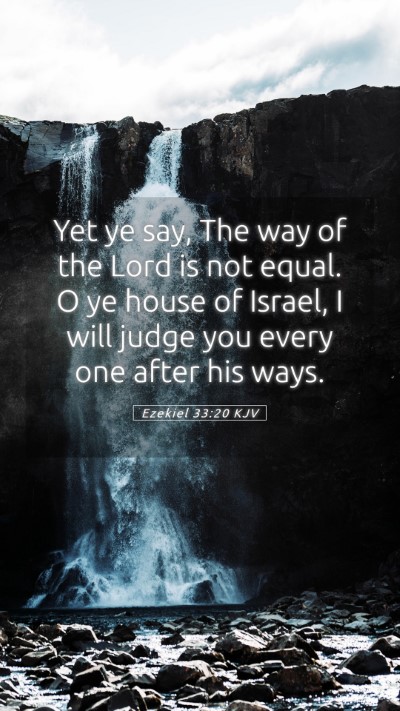Bible Verse Commentary: Ezekiel 33:20
Ezekiel 33:20 states, "Yet you say, 'The way of the Lord is not just.' O house of Israel, I will judge each of you according to your own ways." This verse encapsulates the theme of divine justice and human accountability in God's judgment, prompting essential reflections on moral responsibility.
Understanding Scripture
This passage emerges from a larger context in which God, through the prophet Ezekiel, addresses the Israelite community during their exile. It highlights God’s unwavering commitment to justice and the need for individuals to recognize guilt and responsibility.
Insights from Public Domain Commentaries
- Matthew Henry's Commentary:
Henry emphasizes that the Israelites questioned God's fairness, believing that their fate was unjust. He articulates that God’s judgments are based on individual conduct and draws attention to the importance of personal accountability in the sight of God's justice.
- Albert Barnes' Notes:
Barnes interprets this verse within the theme of correction and warning, asserting that God is notified when people claim that His ways are not fair. He suggests that God's response is not only corrective but also invitational, encouraging them to re-evaluate their own lives and behaviors.
- Adam Clarke's Commentary:
Clarke points out the profound moral lesson embedded in this verse. He emphasizes that a sinner often finds fault with divine justice to ease their guilt. The essence of the message is a call to repentance and awareness of personal wrongdoings.
Key Themes and Analysis
The central theme of Ezekiel 33:20 revolves around:
- Divine Justice:
This verse affirms that God’s judgment is impartial and rooted in righteousness, challenging individuals to confront their personal shortcomings.
- Moral Responsibility:
Ezekiel calls upon the people to acknowledge their decisions and actions, which ultimately lead to their judgment, reminding them that accountability lies with each individual.
- Human Misperception of God’s Ways:
The expression "the way of the Lord is not just" indicates a common human tendency to misinterpret or misrepresent God's actions and intentions based on personal biases.
Application of the Verse
For modern believers, Ezekiel 33:20 serves as a vital reminder of the importance of honest self-reflection and understanding that divine judgment considers personal conduct thoroughly. Here are practical applications:
- Self-Examination:
Encouragement to evaluate one’s life against divine standards rather than societal norms.
- Seeking Justice:
A call for individuals to advocate for fairness and integrity in their communities, fostering a culture that reflects God’s justice.
- Encouraging Accountability:
Promotion of accountability among peers in faith communities to uplift each other in walking righteously before God.
Cross-References
Several other scriptures resonate with the themes presented in Ezekiel 33:20:
- Jeremiah 17:10: God examines the heart and rewards according to the way one lives.
- Romans 14:12: Each person will give an account of themselves to God.
- Matthew 12:36-37: Every word will be accounted for on the day of judgment.
Conclusion
In summary, Ezekiel 33:20 calls believers to a deeper understanding of God's nature and justice. It stresses the need for personal accountability and the importance of aligning one's life with divine principles. By engaging with this scripture, individuals can gain a clearer understanding of their faith and responsibility in the eyes of God.
For those looking for Bible study insights, it is beneficial to explore the context of this verse alongside others to fully appreciate its implications in both historical and modern settings. Each study session can deepen understanding, shed light on biblical exegesis, and provide valuable lessons applicable to daily living.


